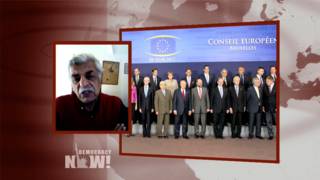
By Amy Goodman with Denis Moynihan
In ancient Greece, the birthplace of democracy, power derived from “demos,” the people. Well, the people of contemporary Greece have been reeling under austerity for five years, and have voted to put an end to it. In January, the anti-austerity Syriza Party was swept to power in national elections. Greece is a member of the so-called eurozone, the nations that joined together with a common currency back in 1999. Following the economic crash of 2009, the Greek economy was in shambles. In 2012, I interviewed economist and Syriza member Yanis Varoufakis, who is now Greece’s minister of finance, and is at the center of the current crisis in the eurozone.
“Greece is going through its Great Depression, something akin to what the United States went through in the 1930s,” he told me. “This is not just a change of government. It’s a social economy that has entered into a deep coma. It’s a country that is effectively verging to the status of a failed state.” In order to stabilize the Greek economy, a bailout package was proposed, delivered by three institutions reviled in Greece as “The Troika”: the European Commission, the European Central Bank and the International Monetary Fund. In exchange for the bailout of more than $100 billion euros, Greece would have to impose strict austerity measures, including mass layoffs of public-sector workers and the sale of public resources, like government-owned port facilities.
For years, the main political parties in Greece accepted the demands of the Troika, repressing the resulting protests with police violence. The new party in power, “Syriza,” is an acronym meaning “Coalition of the Radical Left,” and Varoufakis, along with his colleague Alexis Tsipras as prime minister, wasted no time challenging the austerity measures.
Paul Mason, economics editor at Channel 4 News in the United Kingdom, has been doing some of the best reporting in English on the Greek crisis. On the “Democracy Now!” news hour, I asked him to explain austerity: “Austerity in Greece means something like a 50 percent measurable increase in male suicides. It means real wages fell by 25 percent in five years … you’ve got the 300,000 families who can’t afford electricity.” Interviewed in Der Spiegel, Varoufakis called austerity “fiscal waterboarding.” Greeks, as well, have not forgotten that Germany, under the Nazis, brutally occupied their nation for four years during World War II. Syriza’s representative in the European Parliament, 92-year-old Manolis Glezos, was imprisoned by the Nazis after he tore a swastika flag off of the Acropolis. “The German political class just can’t get their head around the idea,” Mason explained, “that a party has been elected that wants to do something so radically different, that they can’t do it without breaking the rules that the eurozone has been formed around. So it’s becoming cultural.”
Spain also has been wracked by the global recession, with 50 percent unemployment among young people. Bank foreclosures on homes are rampant, leaving people homeless but still required to pay the entire mortgage, leading to many suicides. In the midst of this financial ruin, a grass-roots movement grew, called by some “the Indignados,” the Indignant Ones. Thousands occupied a main square in Madrid, the Puerta del Sol, Gate of the Sun, demanding real democracy. Out of this grass-roots movement a political party was founded last May called “Podemos,” Spanish for “We Can.”
Pablo Iglesias, a 36-year-old former political-science professor, is the secretary-general of Podemos. He came to New York City this week. I asked him about the crisis in Spain, and what Podemos is doing about it: “My country has three big problems: inequality, unemployment and debt,” he explained. “After six years, the situation is worse than before. So, we think that in democracy, if something doesn’t work, you can change … we want to organize another way to improve the situation.”
Two months after Podemos was formed, the party received 1.2 million votes and sent Iglesias and four other Podemos members to the European Parliament. One poll suggests Podemos could win the national election next November. If Podemos does win, Iglesias could well be Spain’s next prime minister. If elected, he promises to stop the evictions, restructure the debt and reform taxes, which, he says, burden the poor and middle class much more than the rich.
The future of Europe is in flux, as popular movements in Greece and Spain gain power and challenge traditional economic and political systems. The global economic crisis created enormous suffering for billions around the world. But it also created an opening, allowing people to reassess the rules under which they live and work, to challenge those in power, and to demonstrate that another world is possible.
Amy Goodman is the host of Democracy Now!, a daily international TV/radio news hour airing on more than 1,300 stations in North America. She is the co-author of “The Silenced Majority,” a New York Times best-seller.
© 2015 Amy Goodman / Distributed by King Features Syndicate
Subscribe to Amy Goodman’s podcast on SoundCloud and Stitcher Radio.











Media Options